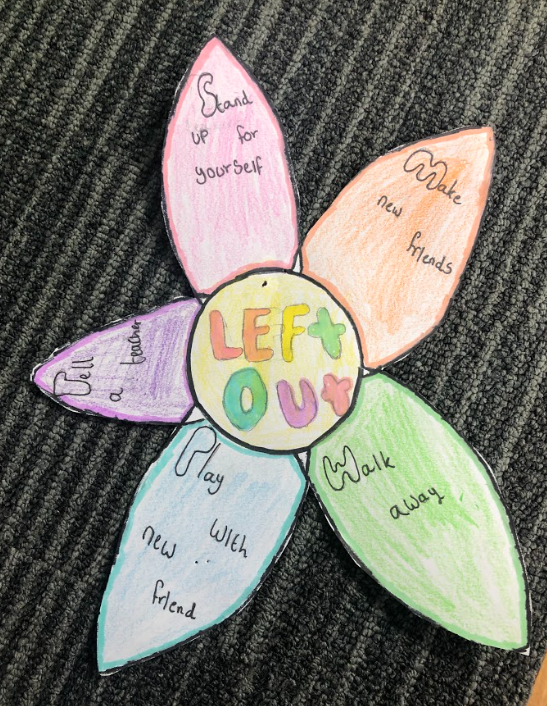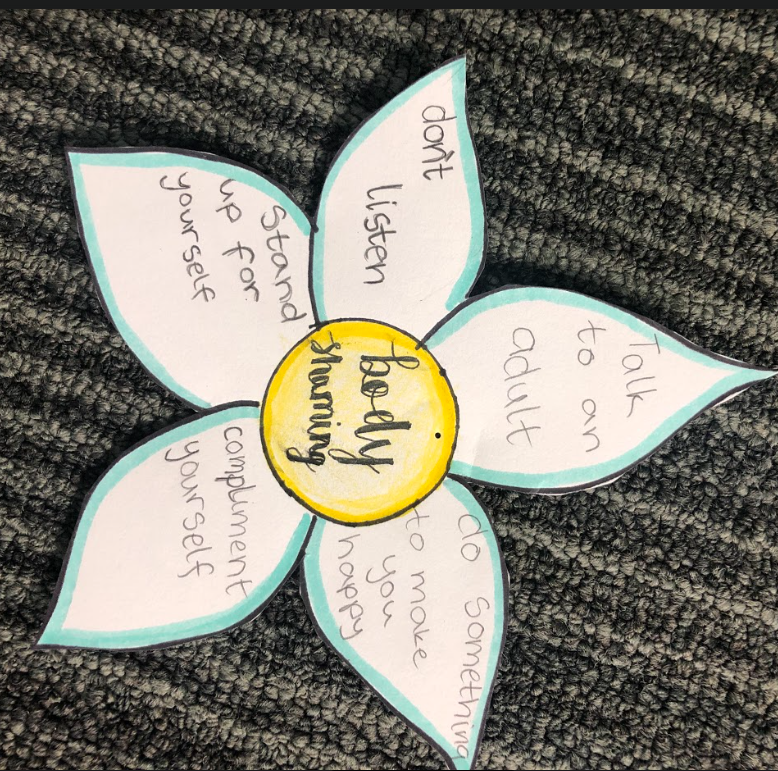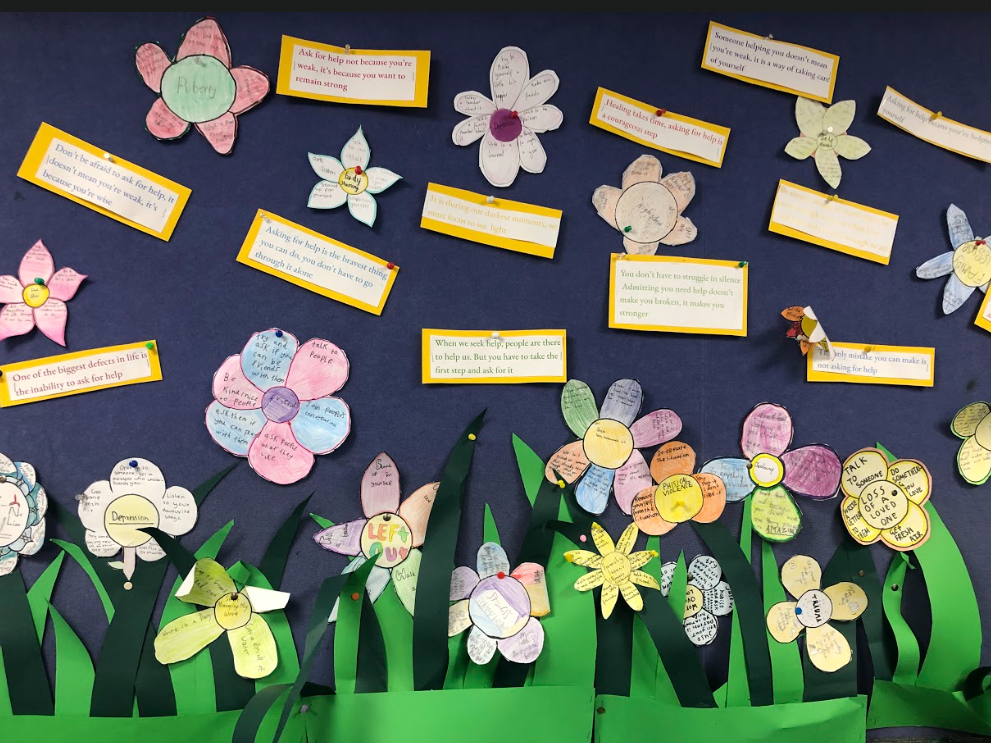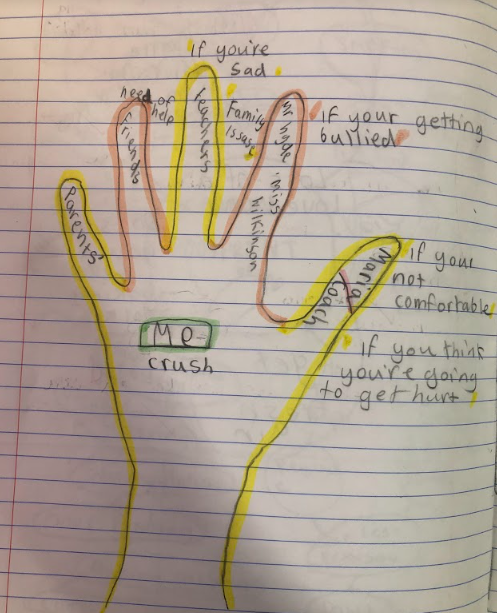Student Well-being

The Year 5/6 Community
Problem Solving
During our wellbeing unit this term, we aimed to help students develop their recognition that problems are a normal part of life and seek out appropriate solutions to manage them. By recognising that there are multiple solutions to a given scenario, and building up this capacity to identify reasonable options, we aim to improve students’ overall ability to problem solve maturely and independently.
In our sessions, students were then given a scenario with a problem. In small groups students discussed how they would go about managing the situation. Students acted out the scenario by demonstrating the wrong way to deal with the situation versSe how to deal with it in a mature manner.
Then, as a whole community, students brainstormed what they felt were some of the current issues their age group faced. Some of these are listed below:
- Stress - high school /change/being new/moving school
- Bullying
- Family issues - getting along with siblings/parents
- Put downs/teasing
- Body shaming/Puberty
- Loss/ Grief
- Disappointment
- Self doubt
- Depression/sadness/anxiety
- Jealousy - comparing ourselves to others
- Friendship problems/exclusion/left out/ making friends
- Trying to fit in
- Pressure - school, pressure from friends
Students focused on one of the scenarios from the list and created their own daisy by brainstorming different options or ways of going about the issue.
The daisies were collated and presented in the classroom as The 5/6 Problem Solving Garden - a place where students can seek advice and manage challenging situations.
Students also brainstormed 5 people they trusted with telling people their problems and asking for advice. We discussed how different scenarios would call for different people in our lives to help us.
R U OK? Day
Today is R U OK? Day.
R U OK? Day is our national day of action dedicated to reminding everyone that any day is the day to ask, "Are you okay?" and support those who may be struggling.
It is so important that we check in on each other and ask the simple question, "Are you okay?"
These conversations can be tricky, therefore it is important we are ready ourselves.
R U OK? Have some great tips on preparing yourself to ask someone if they are okay.
Getting ready to ask:
Before you can look out for others, you need to look out for yourself. And that’s ok. If you're not in the right headspace or you don't think you're the right person to have the conversation, try to think of someone else in their support network who could talk to them.
To help you decide whether you’re ready to start a meaningful conversation, ask yourself:
Am I ready?
- Am I in a good headspace?
- Am I willing to genuinely listen?
- Can I give as much time as needed?
Am I prepared?
- Do I understand that if I ask how someone’s going, the answer could be: “No, I’m not”?
- Do I understand that you can’t ‘fix’ someone’s problems?
- Do I accept that they might not be ready to talk? Or they might not want to talk to me?
Picked my moment?
- Have I chosen somewhere relatively private and comfy?
- Have I figured out a time that will be good for them to chat?
- Have I made sure I have enough time to chat properly?
R U OK? has developed four conversation steps to give you the skills and confidence to navigate a conversation with someone you're worried about.
Tips on how to ask:
1. Ask
Be relaxed, friendly and concerned in your approach.
- Help them open up by asking questions like "How are you going?" or "What’s been happening?"
- Mention specific things that have made you concerned for them, like "You seem less chatty than usual. How are you going?"
IF
- If they don’t want to talk, don’t criticise them.
- Tell them you’re still concerned about changes in their behaviour and you care about them.
- Avoid a confrontation.
- You could say: “Please call me if you ever want to chat” or “Is there someone else you’d rather talk to?”
2. Listen with an open mind
- Take what they say seriously and don't interrupt or rush the conversation.
- Don’t judge their experiences or reactions but acknowledge that things seem tough for them.
- If they need time to think, sit patiently with the silence.
- Encourage them to explain: "How are you feeling about that?" or "How long have you felt that way?"
- Show that you've listened by repeating back what you’ve heard (in your own words) and ask if you have understood them properly.
3. Encourage action
- Ask: “What have you done in the past to manage similar situations?”
- Ask: “How would you like me to support you?"
- Ask: “What’s something you can do for yourself right now? Something that’s enjoyable or relaxing?”
- You could say: "When I was going through a difficult time, I tried this... You might find it useful too."
- If they've been feeling really down for more than 2 weeks, encourage them to see a health professional. You could say, "It might be useful to link in with someone who can support you. I'm happy to assist you to find the right person to talk to.”
- Be positive about the role of professionals in getting through tough times.
IF THEY NEED EXPERT HELP
Some conversations are too big for family and friends to take on alone. If someone’s been really low for more than 2 weeks - or is at risk - please contact a professional as soon as you can.
For more information, please visit https://www.ruok.org.au/
4. Check-in
- Pop a reminder in your diary to call them in a couple of weeks. If they're really struggling, follow up with them sooner.
- You could say: "I've been thinking of you and wanted to know how you've been going since we last chatted."
- Ask if they've found a better way to manage the situation. If they haven't done anything, don't judge them. They might just need someone to listen to them for the moment.
- Stay in touch and be there for them. Genuine care and concern can make a real difference.
Lauren Borg
e-Learning/Student Well-being Leader







